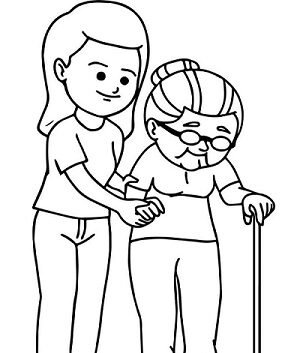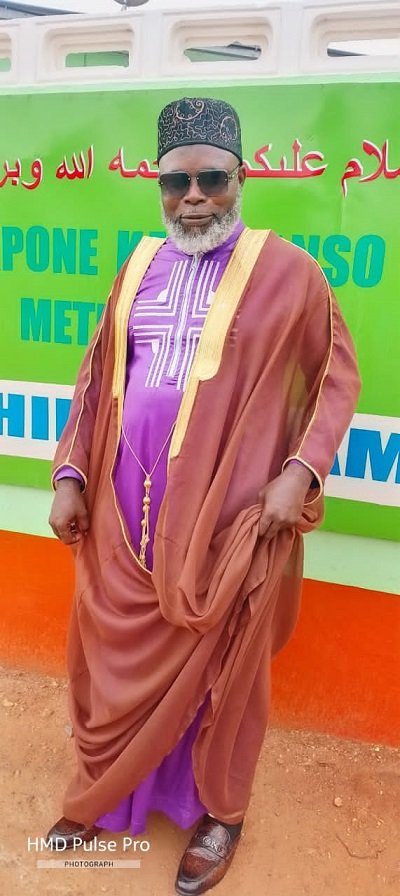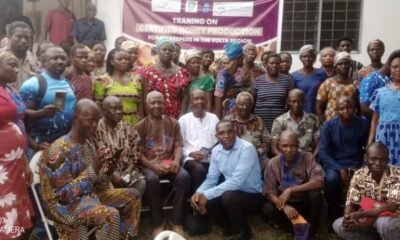Fruitful Living
Caring for the community and one another

• Helping others can help you live longer
“When the Son of Man comes in His glory, and all the angels with Him, He will sit on His glorious throne. All the nations will be gathered before Him, and He will separate the people one from another as a shepherd separates the sheep from the goats. He will put the sheep on His right and the goats on His left.
“Then the King will say to those on his right, ‘Come, you who are blessed by my Father; take your inheritance, the kingdom prepared for you since the creation of the world. For I was hungry and you gave me something to eat, I was thirsty and you gave me something to drink, I was a stranger and you invited me in, I needed clothes and you clothed me, I was sick and you looked after me, I was in prison and you came to visit me.’
“Then the righteous will answer him, ‘Lord, when did we see you hungry and feed you, or thirsty and give you something to drink? When did we see you a stranger and invite you in, or needing clothes and clothe you? When did we see you sick or in prison and go to visit you?’
“The King will reply, ‘Truly I tell you, whatever you did for one of the least of these brothers and sisters of mine, you did for me.’
“Then he will say to those on his left, ‘Depart from me, you who are cursed, into the eternal fire prepared for the devil and his angels. For I was hungry and you gave me nothing to eat, I was thirsty and you gave me nothing to drink, I was a stranger and you did not invite me in, I needed clothes and you did not clothe me, I was sick and in prison and you did not look after me.’“They also will answer, ‘Lord, when did we see you hungry or thirsty or a stranger or needing clothes or sick or in prison, and did not help you?’ “He will reply, ‘Truly I tell you, whatever you did not do for one of the least of these, you did not do for me.’“Then they will go away to eternal punishment, but the righteous to eternal life.”– Matthew 25:31-46.
INTRODUCTION
The parable in Matthew 25:34-40 describes acts of mercy we all can do every day. These acts do not depend on wealth, ability or intelligence; they are simple acts freely given and freely received. We have no excuse to neglect those who have deep needs, and we cannot hand over this responsibility to the church or government. Jesus demands our personal involvement in caring for others’ needs.
The point of this parable is not the who, but the what – the importance of serving where service is needed. The focus of this parable is that we should love every person and serve anyone we can. Such love for others glorifies God by reflecting our love for Him.
When we show mercy, compassion, and kindness (the marks of His Kingdom) to others straits, we are practising the merciful attitude that God expects each of His children to exhibit at all times.
1. Why are we not caring for one another
Unfortunately, the outcome of a society shifting toward individualism is a lack of empathy.–Caring about ourselves and our own welfare, but not caring about others. The effects of this include:
- Economic greed that leads to disparity.
- Neglect of the less fortunate.
- Inability to cooperate with others. Already evident in our polarised political system, where people and parties with opposing views are unable to work together to solve problems.
- The absence of self-sacrifice for the collective good.
BENEFITS OF CARING FOR OTHERS
1. Helping others feels good
There is some evidence to suggest that when you help others, it can promote physiological changes in the brain linked with happiness. This heightened sense of well-being might be the by-product of being more physically active as a result of volunteering, or because it makes us more socially active.
2. It creates a sense of belonging
Helping others can help us to make new friends and connect with our community. Face-to-face activities such as volunteering at a food bank can also help reduce loneliness and isolation.
3. It gives you a sense of purpose
Studies show that volunteering enhances an individual’s overall sense of purpose and identity. This is because helping others can make you feel rewarded, fulfilled and empowered.
4. Giving helps keep things in perspective
Helping others, especially those who are less fortunate than yourself, can help to put things into perspective and make you feel more positive about your own circumstances.
5. It is contagious
One study found that people are more likely to perform feats of generosity after observing another do the same. This effect can ripple throughout the community, inspiring dozens of individuals to make a difference.
6. Helping others can help you live longer
Regular volunteering can improve your ability to manage stress and stave off disease as well as increasing your sense of life satisfaction. This might be because volunteering alleviates loneliness and enhances our social lives.
7. It will give you a sense of renewal
Helping others can teach you to help yourself. If you’ve been through a tough experience or just have a case of the blues, the “activism cure” is a great way get back to feeling like yourself.
8. You’ll boost your self-esteem
People who volunteer have been found to have higher self-esteem and overall wellbeing. The benefits of volunteering also depend on your consistency. So, the more regularly you volunteer, the more confidence you’ll gain.
9. You’ll create stronger friendships
When you help others, you give off positive vibes, which can rub off on peers and improve your friendships. Being a force for good in a friend’s life can help build a lasting bond.
10. You become a glass half-full type person
Having a positive impact on someone else could help you change your own outlook and attitude. Experts say that performing act of kindness boosts your mood and ultimately makes you more optimistic and positive.
Progress depends on our brain. The most important part of our brain, that which is neocortical, must be used to help others not just to make discoveries.” Rita Levi-Montalcini
End Note
In fact, one of the primary ways we can serve God in a very real way is to show kindness to ‘the least of these’, which includes anyone – particularly those among God’s people – who could use our help or attention. These are people who others often overlook because they cannot repay the kindness. Jesus said that when His followers practise active compassion toward others, they are actually doing something for Him. This means that if we want to see or touch Jesus directly, we will have to look for Him in people who are hurting or in need.
Both the faithful and unfaithful were unaware of times when they encountered Jesus in life (Matthew 25:37-39). Even those who did the right thing were seemingly oblivious to when they acted with compassion. It seems that on those occasions when they helped others, the act or actions were not unusual or special in any way; serving others was simply a way of life for them. All of this shows that true service to God often takes place in the more routine and unassuming areas of life – when no one else notices. But God always notices when we do something for Him, and He will reward us accordingly on judgement day.
Stay blessed!
By Dr Joyce Aryee, the author
For further inquiries please contact us on Tel Nos. 0243588467 or 0268130615
Email: saltnlightministries@gmail.com
Website: saltandlightministriesgh.org
Fruitful Living
Eid-ul-Adha: A living legacy of faith, sacrifice, and devotion

We begin in the name of Allah, the Most Merciful, the Most Compassionate. We praise Him, seek His help and forgiveness, and seek refuge in Him from the evils of our souls and the wrongs of our actions.
May peace and blessings be upon the Prophet Muhammad (peace be upon him), his family, his noble companions, and all those who follow his path until the Day of Judgment.
Understanding the essence
of Eid-ul-Adha
Eid-ul-Adha, the Festival of Sacrifice, is one of the two major Islamic celebrations observed by Muslims across the world.
It commemorates the unwavering submission of Prophet Ibrahim (Abraham, peace be upon him) to Allah’s command when he was prepared to sacrifice his beloved son Isma’il (Ishmael, peace be upon him). Allah, in His infinite mercy, intervened and replaced the son with a ram, thus honouring Ibrahim’s sincerity and faith.
This moment of sacrifice is recorded in the Qur’an: “Then when they had both submitted and he put him down upon his forehead, We called out: ‘O Ibrahim! You have fulfilled the vision.’ Indeed, We thus reward the doers of good.” (Surah As-Saffat, 37:103–105)
This act of obedience is not merely a historical account. It is a living symbol that forms the essence of Eid-ul-Adha.
Ibrahim (A.S): The Architect
of Submission
Before the moment of sacrifice, Prophet Ibrahim and his family played critical roles in establishing Islam’s foundational pillars:
1. The building of the Ka‘bah
Prophet Ibrahim and his son Isma’il were chosen to construct the Ka‘bah, the sacred House of Allah in Makkah. The Qur’an records this noble moment:
“And [mention] when Ibrahim was raising the foundations of the House and [with him] Isma’il, [saying], ‘Our Lord, accept [this] from us. Indeed, You are the Hearing, the Knowing.’”
(Surah Al-Baqarah 2:127)
This structure remains the spiritual centre of Muslim worship, facing which over a billion Muslims direct their daily prayers.
2. The struggle of Hajar (Hajara) between Safa and Marwa
The mother of Isma’il, Hajar (Hajara), exemplifies a profound lesson of patience and faith. Left in the barren valley of Makkah with her infant, she ran between the hills of Safa and Marwa, desperately searching for water. Her perseverance was rewarded when the well of Zamzam sprang forth at the feet of her baby.
Her sincere struggle is now ritualised in Hajj as the Sa‘i between Safa and Marwa—a reminder of the role of women, the power of du‘a, and the value of trust in Allah’s provision.
Sacrifice at Mina and the
Rites of Jamarat
During Hajj, pilgrims reenact Ibrahim’s confrontation with Shaytan at Mina, where he rejected the devil’s temptation and cast stones at him. This act is now observed in Hajj as the ritual of stoning the Jamarat, symbolising the rejection of evil, temptation, and disobedience.
It is a vivid spiritual lesson: the path to Allah is one of resistance to distraction and sin, and one must be prepared to fight these forces with unwavering faith.
The essence of Arafat in Hajj
The Prophet Muhammad said:“Hajj is Arafah.” (Sunan al-Tirmidhi, 889)
Standing on the plain of Arafat, in deep humility and supplication, is the heart of Hajj. It represents the Day of Judgment, when all of humanity will stand before their Creator. The Prophet said: “There is no day on which Allah frees more people from the Fire than the Day of Arafah.” (Sahih Muslim, 1348)
For pilgrims, Arafat is a time of repentance, reflection, and renewal— and for non-pilgrims, fasting on that day is highly recommended.
Three core lessons from the
Sacrifice of Prophet Ibrahim
(A.S.)
1. Absolute obedience to Allah
Ibrahim’s willingness to sacrifice his son teaches that the essence of faith is unquestioning obedience to Allah. He prioritised divine command over emotion, logic, or comfort.
Takeaway:
In our lives, we must also be ready to put aside our desires, egos, and even attachments if they conflict with Allah’s instructions. This may involve sacrifices such as waking up for Fajr, staying away from haram income, or being truthful in difficult situations.
2. Sincere intention and inner sacrifice
The real essence of the sacrifice lies in the heart’s submission to Allah.
It is neither their meat nor their blood that reaches Allah, but it is your piety that reaches Him.”
(Surah Al-Hajj 22:37)
Takeaway:
Every act of worship should be grounded in sincerity. Whether it is prayer, charity, or sacrifice, what matters most is the purity of our intention.
3. Sacrifice for the greater good
The legacy of Eid-ul-Adha teaches us that sometimes, faith requires us to give up what we love for a greater purpose. Sacrificing wealth, time, or status in the path of Allah or for the benefit of others leads to spiritual elevation.
Takeaway:
Use your resources such as time, money, skills, for acts of benefit: support the poor, educate the young, assist the sick, and build your community.
Celebrating Eid-ul-Adha: A
Festival for all Muslims
Even for those who do not go on Hajj, Eid-ul-Adha holds immense significance. Muslims across the world participate in the act of Qurbani (sacrifice) to honor the tradition of Ibrahim (A.S.).
Types of animals and their
symbolism
Permissible animals include goats, sheep, cows, and camels. Each must meet a minimum age and be free of defects. The sacrificed animal is then divided into three parts: one for the family, one for relatives and friends, and one for the poor and needy.
This distribution reflects the spirit of sharing, compassion, and social responsibility—values at the heart of Islam.
The eternal message of Eid-ul-Adha
Eid-ul-Adha is not merely a celebration; it is a living tradition that calls us to:
• Submit like Ibrahim,
• Strive like Hajar,
• Sacrifice like Isma’il,
• Reflect like the pilgrims at Arafat.
May this Eid awaken within us a renewed commitment to obedience, sincerity, and compassion.
Let us make every Eid-ul-Adha a step forward in our spiritual journey, embodying the values of submission, sacrifice, and service to humanity. I wish every Muslim Eid Mubaarak
By Imaam Alhaji Saeed Abdulai
(Kpone Katamanso Metropolitan Chief Imaam)
Fruitful Living
Steps taken by government to combat illicit drugs (Final part)
The Minister for the Interior, Muntaka Mohammed-Mubarak, has reaffirmed the government’s commitment to combating drug abuse and illicit trafficking for a safer environment which would
go a long way to make Ghana a drug-free country. 3News.com (2025)
Solutions to Illicit Drugs from the Islamic perspective
are comprehensive and emphasise of both prevention and treatment:
Tarbiyah (Islamic nurturing): Instilling strong Islamic values from childhood through Qur’anic education, regular prayer, and association with righteous companions.
Community preaching (Da’wah): Imams must consistently raise awareness during khutbahs and Islamic programs about the dangers of drugs and the beauty of a sober, productive life.
Faith-based rehabilitation: Mosques and Islamic centers can partner with medical institutions to offer Qur’an therapy, spiritual counseling, and structured recovery programs.
Islamic youth clubs: Providing youth with halal entertainment, mentorship, and purposeful engagement can steer them away from harmful peer groups.
Zakat and Sadaqah: Channelling funds to support families of victims and establishing centres for rehabilitation.
Role of Parents, Society, Muslim Chiefs and Imams:
Parents must be vigilant and provide emotional support. A loving, nurturing home reduces a child’s vulnerability to drugs.
Society should de-stigmatize addiction. Drug users should be seen as patients needing healing, not criminals deserving rejection.
Muslim Chiefs must lead community campaigns, setting moral examples and supporting policy enforcement.
Imams must be more than religious leaders—they must become counsellors, educators, and advocates. Their leadership can shift public perception and guide collective action.
Conclusion
Illicit drugs pose one of the most dangerous threats to our society, undermining our religious values, harming our youth, and destroying our future. The Islamic position is clear and
Unequivocal: such substances are forbidden due to their destructive consequences on all aspects of life. Islam does not merely condemn the act but calls for a holistic response—spiritual, social, and structural.
As a society, particularly as Muslims, we must rise to confront this crisis with faith, compassion, and commitment. We must not only preach against drugs but actively work to rehabilitate victims, educate the next generation, and partner with public institutions to create a society of wellness and righteousness.
Recommendations
1. Introduce Islamic drug awareness education in madrasas and public schools, using Quran and Hadith-based materials to instill moral responsibility.
2. Create partnerships between the Ghana Narcotics Control Commission, Ghana Health Service, and Muslim organisations to develop culturally sensitive rehabilitation centres.
3. Train Imams and teachers in basic mental health and drug abuse counselling to serve as front-line responders in communities.
4. Utilise Friday sermons (khutbahs) nationwide to address the dangers of drug abuse periodically and provide practical steps for prevention.
5. Encourage community surveillance, where parents, chiefs, and youth groups report dealers and suspicious activities to the authorities.
6. Establish mentorship programmes in every Muslim community where successful, drug-free role models mentor youth.
7. Form interfaith coalitions, working across religious lines to tackle the drug menace as a national threat rather than a religious issue.
8. Provide job skills training for rehabilitated victims, helping them reintegrate into society and live dignified, self-sufficient lives.
By Imam Alhaji Saeed Abdulai, the Author







